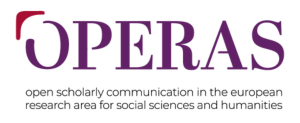Special Interest Groups

What are OPERAS Special Interest Groups?
OPERAS Special Interest Groups (SIG) were launched at the First OPERAS Workshop, held on 26/27 June 2017 in Amsterdam, under the name of “Working Groups”. They first presented their work at the OPERAS Conference “Open Scholarly Communication in Europe. Addressing the Coordination Challenge”, which took place from 31 May – 1 June 2018 in Athens. Each group published a white paper in July 2018. With the creation of OPERAS legal entity in March 2020, the working groups are relaunched as “Special Interest Groups”.
Special Interest Groups work collaboratively, share information, watch, and prepare projects on their topic. Each SIG works under the responsibility of a contact point who is, in most cases, an OPERAS core member. Each contact point gathers and coordinates the participants of its SIG. Special Interest Groups are open to all.
In OPERAS Governance, SIG compose the Assembly of the Commons. The Assembly of the Commons is planned to engage with the whole community in its diversity. In this regard, SIG serve as an entry door for new OPERAS members.
Thus, SIG are the place where new initiatives, new discussions take place and emerge. Their work constitutes the ground on which the infrastructure will build its strategy and prepare its next projects. The SIGs live from a great international working atmosphere and a divers participation. They gather from an equally ranking within each other and shared interests.
The Advocacy Special Interest Group addresses advocacy in SSH, Open Science and Open Access publishing. The group offers reflection, provides recommendations and guidelines, and offers networking and support to various communities on the national and international level: researchers and research organizations, publishers, librarians and infrastructure providers, politicians and funding organizations.
White Paper doi: 10.5281/zenodo.1324035
Publishing is a composite activity that includes several components. Therefore, the adoption of best practices in academic publishing should address all aspects: service provision to authors, publishers agreements, peer-reviewing, editing, usage of open access licenses, dissemination, metrics and digital preservation. On each of these topics, best practices charts and lists have been elaborated by different academic and professional networks and already exist, gaining enough consensus in the community to be adopted by OPERAS consortium without the need for reinvention from the start. The Best Practices Special Interest Group works on identifying the most accepted best practices for each case and plans concrete and specific actions for their implementation by OPERAS partners. It also works on the management of the transition to Open Access.
White Paper is coming soon
3. Common Standards and FAIR Principles
Open Science represents a new approach to the research process that seeks to ensure that access to the entire life cycle of research remains fundamentally open and replicable. The SIG “Common Standards and FAIR Principles” aims at exploring the workflows, mediums and technical standards that have recently emerged as a result of the changes brought about by the transition to Open Science. In the context of the work undertaken by the SIG, common standards and FAIR (findable, accessible, interoperable, and reusable) principles are examined as key operational and technical aspects that ensure content quality and interoperability for scholarly output in the social science and humanities (SSH).
White Paper doi: 10.5281/zenodo.1324065
Scholarly publication is indisputably boosted by the use of the English language. However, the need to publish in English in order to get visibility and recognition represents an impoverishment of certain research fields, particularly in Social Sciences and Humanities. Taking this backdrop as reference, the Special Interest Group Multilingualism aims to support researchers who want to continue publishing in their own language and to develop transnational scientific cooperation at the same time. The SIG works on: translation, multilanguage discovery tool and the endowment of national languages.
White Paper doi: 10.5281/zenodo.1324025
5. Open Access Business Models
The Open Access Business model Special Interest Group works on the main business models currently used by open access publishers, with a particular focus on the situation of European publishers in the social sciences and humanities, especially journals and monographs, in light of the Plan S guidelines. Furthermore, the group examines price transparency, and revenue infrastructure and management platforms.
White Paper doi: 10.5281/zenodo.1323707
The Special Interest Group Open Access Books Network (OABN) is an open and free network for anyone interested in Open Access books. Officially launched in 2020 by members of SPARC Europe, ScholarLed, OPERAS and the OAPEN Foundation, the OABN is an open and bottom-up initiative bringing together a global community of individuals interested in open access book publishing, including publishers, researchers, librarians and other stakeholders. The OABN runs a wide range of activities, including events exploring new developments in OA books, workshop series examining policy options for OA books, discussion forums among others.
The Special Interest Group (SIG) “Tools and Platforms”, former “Tools R&D”, works on emerging practices and needs concerning open scholarly communication tools and services. It focuses on the tools enabling the main publishing activities, like writing, peer-reviewing and disseminating; it also entails, more broadly, activities related to scholarly communication, like annotating or translating. Formerly named SIG “Tools and R&D”, the SIG still has a strong interest in tracking useful and cutting-edge innovations in the publishing area.
The main objectives of the SIG are to provide guidance in front of a complex and evolving context, and to examine how the tools and platforms development could actually benefit the open scholarly communication community in the Social Sciences and Humanities (SSH).
White Paper doi: 10.5281/zenodo.1324109
